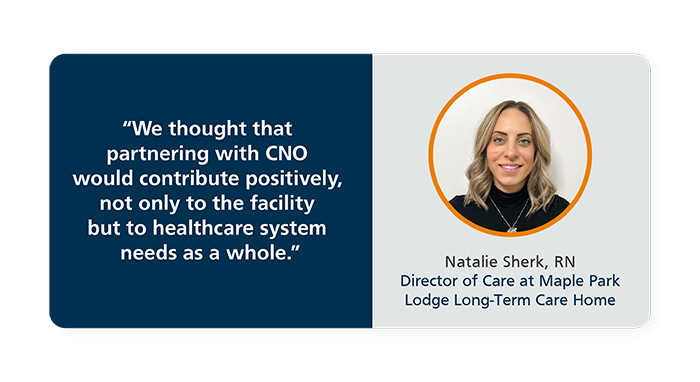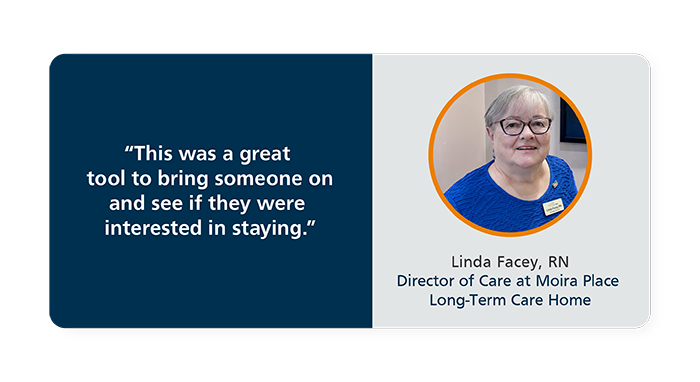Natalie Sherk has seen the value of the Supervised Practice Experience Partnership (SPEP) firsthand.
An RN and the Director of Care at Maple Park Lodge long-term care home in Fort Erie, Ont., Sherk is aware of the needs at the facility, where she has worked for the past two and a half years.
After SPEP was launched in Jan. 2022, Sherk connected the dots and saw how the program could be a win for everyone — for her workplace, staff, the broader health care system and for clients.
“We thought that partnering with CNO would contribute positively, not only to the facility but to health care system needs as a whole,” she told The Standard.

The program is a partnership between the CNO, Ontario Health and CNO-approved organizations. Completing practice experience helps applicants complete the registration requirements to become a nurse with the knowledge, skill and judgment to practice safely in Ontario. You can read answers to SPEP FAQs here.
So far, over 3,000 nurses have gained their practice experience and registered as nurses through SPEP.
Four people have completed SPEP and are working as nurses at Maple Park Lodge, and a fifth is currently in the process of getting their hours. For a facility with 15 RNs, SPEP graduates represent a good chunk of the workplace’s nurses.
“For us, staff retention is crucial,” Sherk said, explaining SPEP’s value. Identifying Personal Support Workers in the workplace who are eligible and interested, and supporting them through the process, has been a win-win for Maple Park Lodge and its staff, she said.
“It’s great for us, being a smaller long-term care home in an isolated area,” Sherk added.
Long-term care homes throughout the province have found SPEP to be a helpful initiative. According to CNO SPEP statistics, as of Feb. 2, of the 696 approved employers for the program, 389 are long-term care homes. The program has matched 1,791 applicants with long-term care homes so far.
Moira Place long-term care home in Tweed, Ont., is another facility that has used SPEP. Director of Care Linda Facey, RN, explains that the facility tries to make the most of the various initiatives and programs to support nursing training, and SPEP has been welcome. “It was very useful,” she told The Standard. “This was a great tool to bring someone on and see if they were interested in staying.”

So far, two nurses have completed SPEP at Moira Place, including one who continues to work at the facility.
Sherk, the Director of Care at Maple Park Lodge, said part of what makes SPEP appealing is its ease. “CNO has made it very easy to participate in this program. It was a matter of filling out an application form.”
Once approved for SPEP, Maple Park Lodge pairs an applicant with some of their longstanding nurses, so they can learn policies and procedures. It’s all about making sure they have the knowledge, skill and judgement to practice safely.
Sherk added that, once applicants meet all of their practice requirements through SPEP, it has taken only a couple of days for them to receive CNO approval as nurses. From the employer side of things, she also added it is a “very simple process” for reimbursement of the practice hours.
It all adds up to an experience that works for everyone and feels rewarding. “It’s rewarding to know you can assist people to achieve their dreams.”